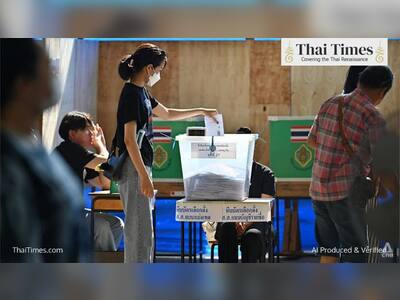
Projected Corporate Bond Issuance in Thailand Aims for Stability Amid Economic Challenges
Thai Bond Market Association estimates corporate bond issuance at B850-900 billion for 2025 as economic and geopolitical factors exert pressure.
The Thai Bond Market Association (ThaiBMA) has projected that corporate bond issuance in Thailand will fall between 850 to 900 billion baht for the year 2025, a figure that mirrors the previous year's estimates.
This projection comes amid an economic slowdown and the ramifications of a recent earthquake that affected various sectors of the economy.
Ariya Tiranaprakit, the executive vice-president of ThaiBMA, highlighted that smaller companies are likely to find it more difficult to raise capital through bond issuance in this challenging economic environment.
She noted a distinct shift among investors from high-yield bonds toward those exhibiting higher credit ratings, indicative of increased risk aversion.
In contrast, large corporations have begun to capitalize on opportunities to issue bonds via public offerings (POs), particularly as interest rates appear to be on a declining trend.
Notably, Gulf Energy Development successfully raised 30 billion baht through a bond public offering in the first quarter of 2025.
Investors are responding to global uncertainties, including ongoing trade tensions and other geopolitical factors, by seeking the relative safety offered by bonds.
Ariya mentioned that as many local and international investors turn to bonds viewed as secure assets, the Thai bond market is expected to grow in strength.
The overall bond market in Thailand expanded by 2.2% in the three months leading up to March 2025, driven mainly by an increase in government bond issuances.
As of the end of the first quarter, corporate bonds displayed stability.
Higher-rated bonds enjoyed more issuances than maturities during this period.
The ThaiBMA reported that foreign investors were net buyers of 18 billion baht in Thai bonds year-to-date, despite a dip in January where they sold 12 billion baht.
Recovery ensued in February and March with net purchases amounting to 22.3 billion baht, following significant geopolitical events.
By the end of March 2025, foreign holdings of Thai bonds reached 874 billion baht, which accounted for 5% of the total bond market.
Furthermore, forecasts suggest that the Bank of Thailand may implement cuts to its policy rate one to two times in the latter half of 2025, potentially reducing rates by 25 to 50 basis points (bps).
According to Managing Director Somjin Sornpaisarn of ThaiBMA, the bond market's outstanding value at the end of the first quarter stood at 17.5 trillion baht, reflecting a 2.2% year-on-year increase largely attributed to the issuance of government bonds.
Long-term corporate bond issuance reached 204 billion baht, representing a slight decline of 1.76% from the prior year.
It was noted that investment-grade bonds outperformed high-yield bonds, which experienced fewer new issuances compared to the number that matured.
Activity in the bond market was notably concentrated in three sectors: energy, property, and finance.
The government bond yield curve saw a decline, particularly following an unexpected rate cut by the central bank to 2%, leading to a drop in yields for various bond maturities.
The anticipated declines in yields remain contingent on the central bank's monetary policy, economic growth outlook, and interest rate shifts in major economies; the bond market is expected to respond sensitively to such developments.
High-yield bonds amounting to 95 billion baht are set to mature in 2025, with 14% potentially facing rollover difficulties, particularly among smaller issuers.
These entities may need to obtain bondholder approval to postpone debt payments to circumvent defaults.
Somjin noted that while bond defaults have decreased, issuers increasingly seek approval to postpone payments, leading to fewer defaults overall.
Meanwhile, the Thai currency has been under pressure, expected to test lows of around 34.50 per US dollar in the coming month.
This depreciation follows the US announcement of reciprocal tariffs of 37% on Thai imports, significantly affecting investor sentiment and contributing to a risk-off environment.
The baht has fluctuated within a trading range influenced by these tariffs, impacting various sectors of the Thai economy.
While the pharmaceutical and medical device industries have avoided the brunt of the tariffs, the government is exploring measures to mitigate the broader economic impact, including infrastructure investments and potential negotiations to stabilize trade relations with the United States.
This projection comes amid an economic slowdown and the ramifications of a recent earthquake that affected various sectors of the economy.
Ariya Tiranaprakit, the executive vice-president of ThaiBMA, highlighted that smaller companies are likely to find it more difficult to raise capital through bond issuance in this challenging economic environment.
She noted a distinct shift among investors from high-yield bonds toward those exhibiting higher credit ratings, indicative of increased risk aversion.
In contrast, large corporations have begun to capitalize on opportunities to issue bonds via public offerings (POs), particularly as interest rates appear to be on a declining trend.
Notably, Gulf Energy Development successfully raised 30 billion baht through a bond public offering in the first quarter of 2025.
Investors are responding to global uncertainties, including ongoing trade tensions and other geopolitical factors, by seeking the relative safety offered by bonds.
Ariya mentioned that as many local and international investors turn to bonds viewed as secure assets, the Thai bond market is expected to grow in strength.
The overall bond market in Thailand expanded by 2.2% in the three months leading up to March 2025, driven mainly by an increase in government bond issuances.
As of the end of the first quarter, corporate bonds displayed stability.
Higher-rated bonds enjoyed more issuances than maturities during this period.
The ThaiBMA reported that foreign investors were net buyers of 18 billion baht in Thai bonds year-to-date, despite a dip in January where they sold 12 billion baht.
Recovery ensued in February and March with net purchases amounting to 22.3 billion baht, following significant geopolitical events.
By the end of March 2025, foreign holdings of Thai bonds reached 874 billion baht, which accounted for 5% of the total bond market.
Furthermore, forecasts suggest that the Bank of Thailand may implement cuts to its policy rate one to two times in the latter half of 2025, potentially reducing rates by 25 to 50 basis points (bps).
According to Managing Director Somjin Sornpaisarn of ThaiBMA, the bond market's outstanding value at the end of the first quarter stood at 17.5 trillion baht, reflecting a 2.2% year-on-year increase largely attributed to the issuance of government bonds.
Long-term corporate bond issuance reached 204 billion baht, representing a slight decline of 1.76% from the prior year.
It was noted that investment-grade bonds outperformed high-yield bonds, which experienced fewer new issuances compared to the number that matured.
Activity in the bond market was notably concentrated in three sectors: energy, property, and finance.
The government bond yield curve saw a decline, particularly following an unexpected rate cut by the central bank to 2%, leading to a drop in yields for various bond maturities.
The anticipated declines in yields remain contingent on the central bank's monetary policy, economic growth outlook, and interest rate shifts in major economies; the bond market is expected to respond sensitively to such developments.
High-yield bonds amounting to 95 billion baht are set to mature in 2025, with 14% potentially facing rollover difficulties, particularly among smaller issuers.
These entities may need to obtain bondholder approval to postpone debt payments to circumvent defaults.
Somjin noted that while bond defaults have decreased, issuers increasingly seek approval to postpone payments, leading to fewer defaults overall.
Meanwhile, the Thai currency has been under pressure, expected to test lows of around 34.50 per US dollar in the coming month.
This depreciation follows the US announcement of reciprocal tariffs of 37% on Thai imports, significantly affecting investor sentiment and contributing to a risk-off environment.
The baht has fluctuated within a trading range influenced by these tariffs, impacting various sectors of the Thai economy.
While the pharmaceutical and medical device industries have avoided the brunt of the tariffs, the government is exploring measures to mitigate the broader economic impact, including infrastructure investments and potential negotiations to stabilize trade relations with the United States.











